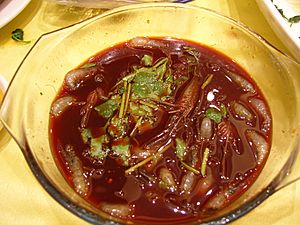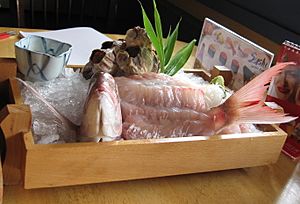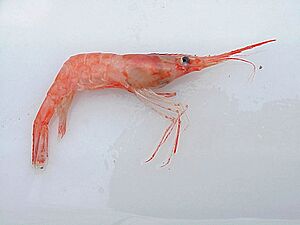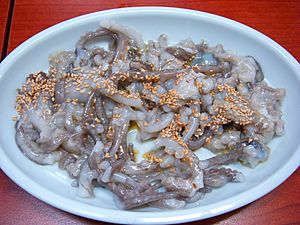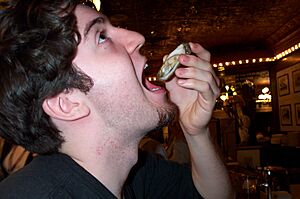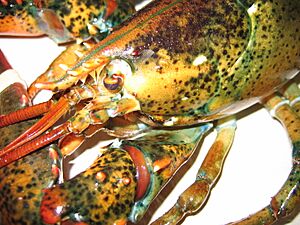Eating live seafood facts for kids
The practice of eating certain seafood while it is still alive is common in some parts of the world. One example is oysters, which are often eaten live. There has been a lot of discussion about whether it is right to eat oysters this way. Some people, like the philosopher Peter Singer, have changed their minds about it over time. Currently, he believes that eating oysters is okay if they are caught in a way that doesn't harm the environment, because there is little evidence that oysters can feel pain.
Contents
Popular Live Seafood Dishes Around the World
Some cultures enjoy dishes made with seafood that is prepared and eaten while still alive. These dishes are often seen as very fresh.
Live Seafood Dishes in Asia
Many unique live seafood dishes can be found in Asian countries.
Drunken Shrimp in China
Drunken shrimp is a well-known dish in parts of China. It uses fresh-water shrimp. The shrimp are placed in a strong alcoholic drink called baijiu. They are then eaten, sometimes while they are still alive. Other ways to make this dish include cooking the shrimp in boiling water first. Or, the shrimp can be boiled and then soaked in alcohol.
Yin Yang Fish from Taiwan
Yin Yang fish, also known as 'dead-and-alive fish', started in Taiwan. This dish is a whole fish, usually a carp, that is deep-fried. However, the fish's head is kept wet and alive during cooking. The cooked body is then covered in sauce and served while the fish's head is still breathing. Some chefs say they prepare it this way to show how fresh the fish is. This way of preparing fish is now not allowed in Taiwan, Australia, and Germany.
Ikizukuri in Japan
Ikizukuri means "prepared alive" in Japanese. It is a type of sashimi (thinly sliced raw fish) made from live seafood. Fish like tuna, mackerel, and salmon are often used. Sometimes, inkfish like octopus or shellfish like shrimp and lobster are also used. This practice is debated, and ikizukuri is not allowed in Australia and Germany.
Odori Ebi: Dancing Shrimp
Odori ebi means "dancing shrimp" in Japanese. It is a special sashimi dish. It uses live baby pink shrimp. These shrimp are usually dipped in Japanese rice wine. They are eaten quickly while they are still moving. This dish is also eaten in Thailand, where it is called Goong Ten.
San-nakji: Live Octopus in Korea
Sannakji is a type of hoe, which is a raw dish from Korea. It is made from small octopus, often called "baby octopus" because of their size. The octopus is cut into small pieces and served right away. It is seasoned with a little sesame oil. People eat the dish while the pieces are still moving on the plate.
Widespread Live Seafood Dishes
Some live seafood dishes are enjoyed in many places around the world.
Live Oysters
Oysters are often eaten live. They are usually shucked (opened) right before being served.
Live Lobster
In some restaurants, like those in New York City, live lobster is served. Customers can choose their lobster, and it is prepared fresh.


